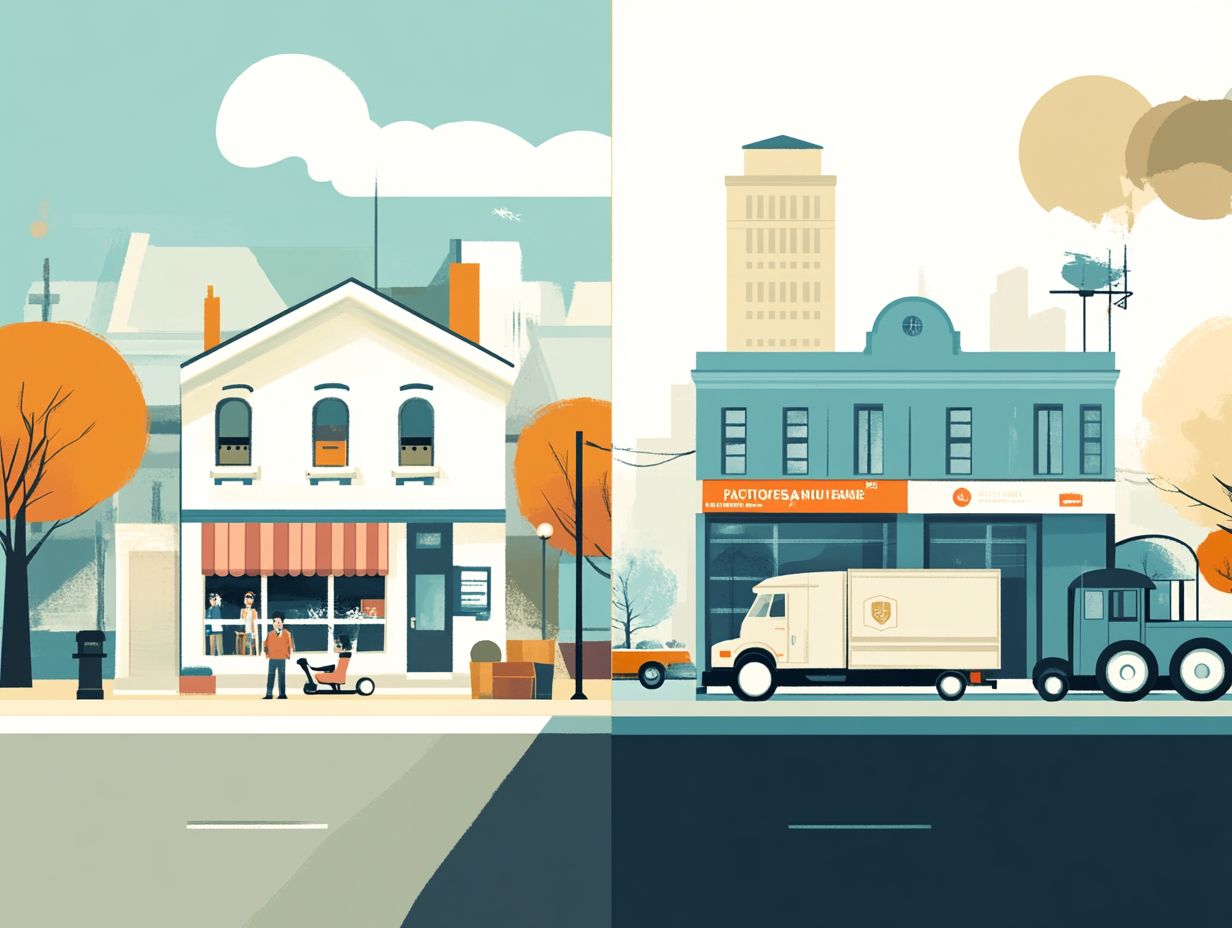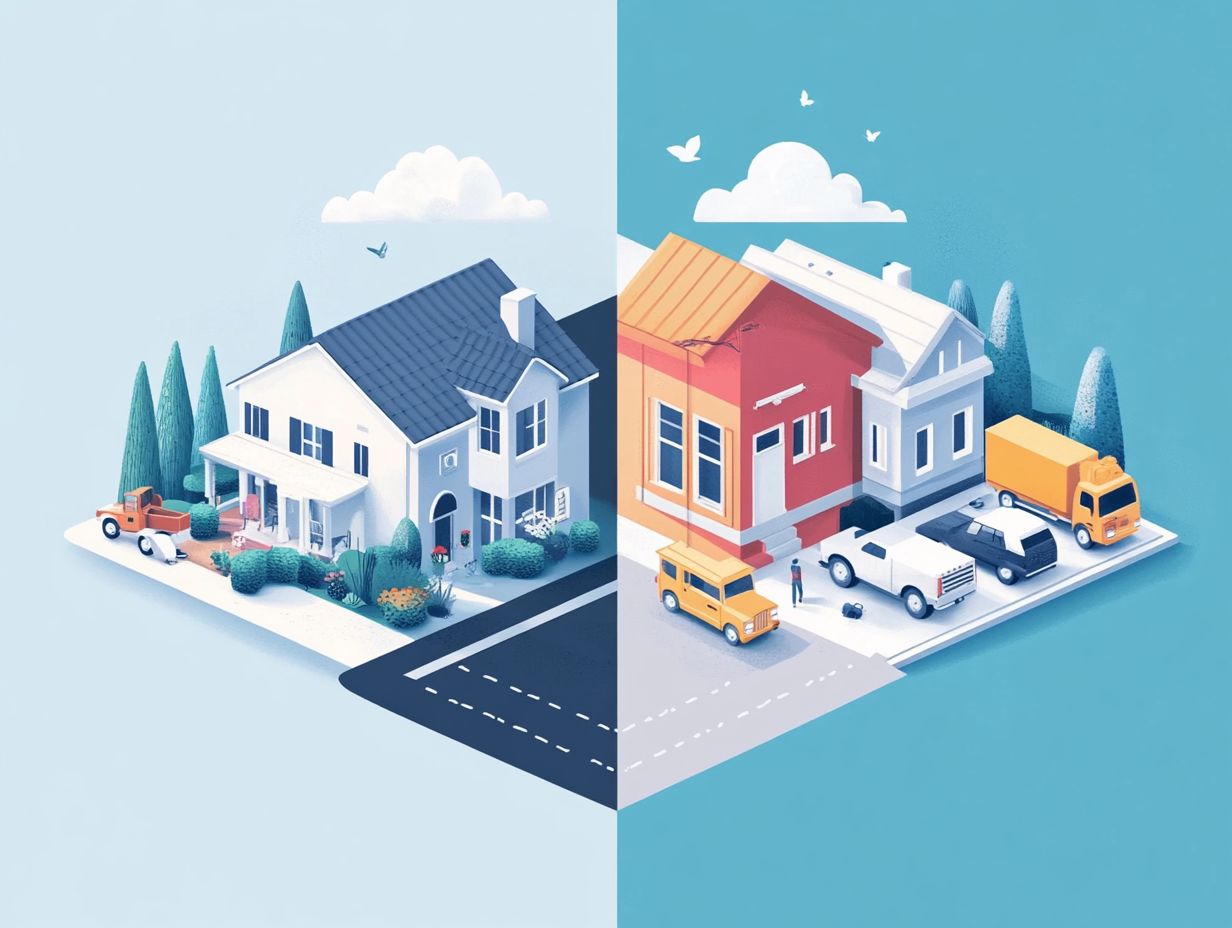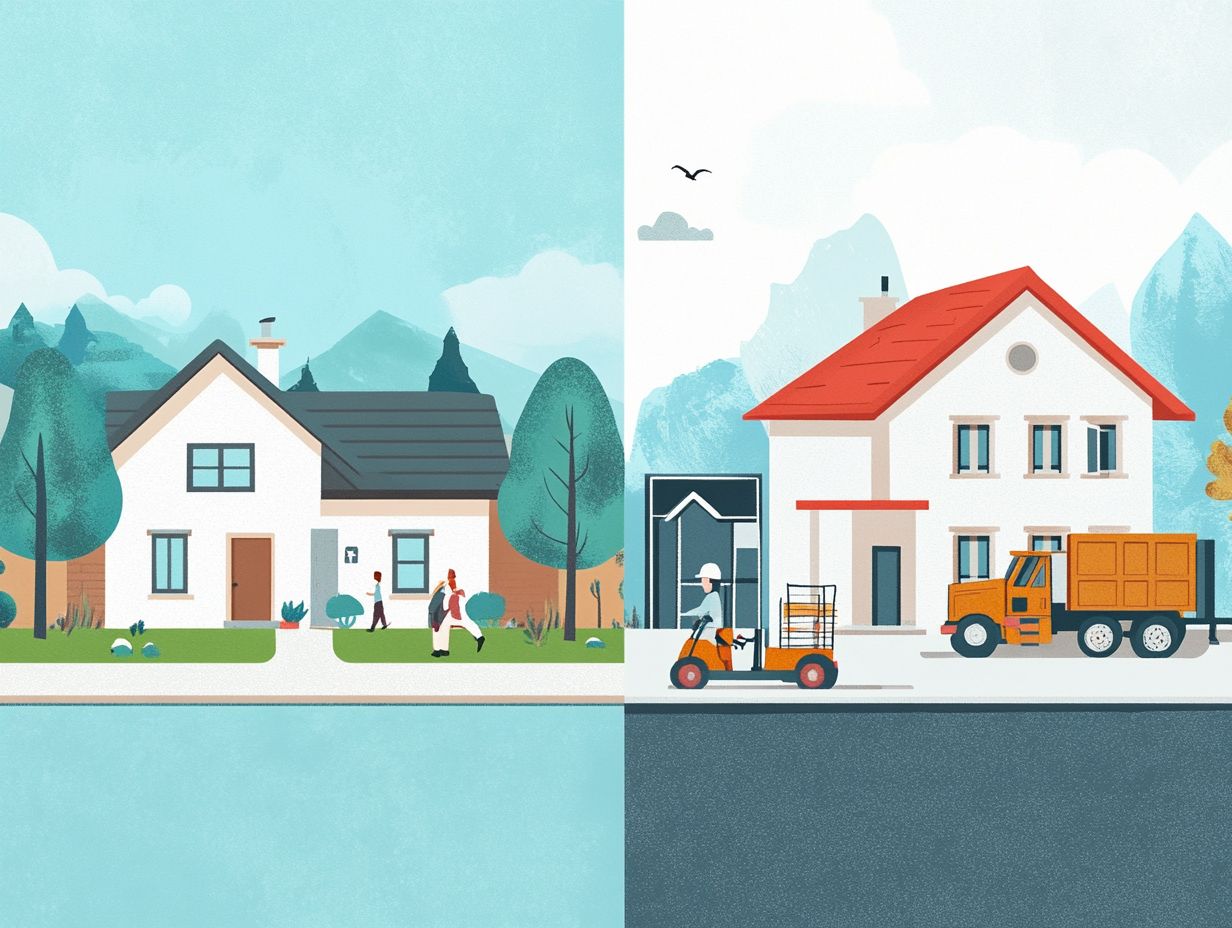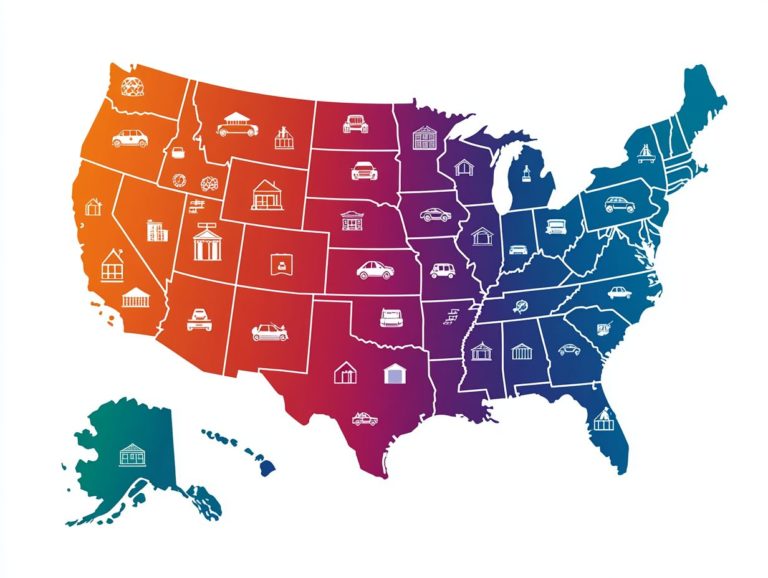5 Differences Between Personal and Commercial Insurance
Understanding insurance can be tough, especially when deciding between personal and commercial coverage.
If you’re a homeowner wanting to protect your assets or a business owner minimizing risks, knowing the differences in these insurance types is crucial.
Get ready to discover the key differences that matter! This article highlights aspects such as coverage limits, policy costs, claims processes, and legal requirements.
It also offers valuable tips on choosing the right insurance and strategies to save on premiums, empowering you to make informed decisions.
Contents
- Key Takeaways:
- 1. Coverage Limitations
- 2. Policy Cost
- 3. Types of Risks Covered
- 4. Claims Process
- 5. Legal Requirements
- What Is Personal Insurance and When Is It Needed?
- Frequently Asked Questions
- What is the main difference between personal and commercial insurance?
- What types of coverage are included in personal insurance?
- What types of coverage are included in commercial insurance?
- How are premiums determined for personal and commercial insurance?
- Can personal and commercial insurance be bundled together?
- What are some common types of personal insurance claims?
Key Takeaways:

- Personal and commercial insurance have different coverage limits, with personal insurance tailored to individuals and commercial insurance covering larger business risks.
- The cost of personal insurance is usually lower than that of commercial insurance due to the smaller scope of coverage and lower risk factors.
- Personal insurance covers risks related to individual property and liability, while commercial insurance addresses risks tied to business operations and liability.
1. Coverage Limitations
Coverage limitations in insurance policies can significantly impact you, whether you re a consumer or a business owner. These restrictions dictate the extent of your financial protection when claims arise due to liability issues, property damage, or other unforeseen events.
To ensure you have the right property coverage and liability insurance tailored to your specific needs be it personal or commercial it s crucial to understand coverage limits.
Many policies have different degrees of coverage, such as actual cash value and replacement cost, which influences how much compensation you receive when making a claim. Exclusions for natural disasters or specific liabilities can create costly gaps in your protection.
Start by assessing your unique risk levels. Review past incidents and understand your property’s vulnerabilities. This review helps you choose the right coverage that meets legal requirements and aligns with your financial situation, ensuring better preparation for potential risks.
2. Policy Cost
The cost of insurance policies can vary dramatically, influenced by several factors. These include the types of coverage you select, the specific forms your insurer employs, and your individual or business risk profile.
If these factors aren’t properly addressed, they could lead to significant financial loss. Policy costs are greatly affected by coverage limits, which represent the maximum amount your insurer will pay in the event of a loss.
Holding a personal or commercial policy can greatly affect pricing. Market trends, such as fluctuations in supply and demand, regulatory changes, and emerging risks, play a pivotal role in determining premiums.
By understanding these elements, you can evaluate your insurance options more effectively, customizing your coverage to align with your unique needs while avoiding the pitfalls of underinsurance or overpaying for unnecessary protection.
Don t wait! Start assessing your insurance needs today!
3. Types of Risks Covered
Insurance solutions address various types of risks. These cover everything from commercial risks faced by businesses to the essential liability exposures and property coverage for individual consumers. This ensures you are shielded against potential financial loss stemming from unexpected events.
These policies cover many situations, including natural disasters, theft, and workplace injuries. Each of these can significantly affect your personal finances and business operations.
For individual consumers, understanding personal insurance like homeowners or auto insurance is vital. This knowledge helps safeguard your assets and achieve peace of mind in times of emergencies.
Businesses need to understand commercial insurance, which includes coverage for product liability and business interruption. This protects their investments and ensures operational continuity.
By thoughtfully assessing specific needs and consulting with insurance professionals, you can select tailored coverage that minimizes risk and enhances your overall protection.
4. Claims Process

The claims process is a pivotal part of your insurance experience. It comprises a series of steps you’ll need to navigate to receive compensation for covered losses.
Underwriters and service agents play crucial roles in ensuring this procedure unfolds smoothly and efficiently.
First, you ll need to report the incident to your insurance provider, providing all the necessary details about the event. After that, the insurer will assign a claims adjuster to investigate your claim, gathering relevant information to assess its validity.
Throughout this journey, your insurance agent will be your essential ally, guiding you through the complexities of paperwork and required documentation.
Grasping these steps gives you the power to set realistic expectations regarding timelines and potential outcomes. This understanding can ultimately lead to a more satisfying resolution as you await your settlement.
5. Legal Requirements
Legal requirements for insurance can differ significantly based on your state and the type of coverage you need. It’s essential for both consumers and businesses to ensure they meet necessary insurance requirements, particularly regarding liability and the coverage types mandated by law.
Take auto insurance, for example. You’re typically required to maintain a minimum level of liability coverage to protect against damages you might cause to others in an accident.
On the business side, workers’ compensation insurance is critical for protecting your employees from work-related injuries. Neglecting these legal obligations can lead to severe consequences.
These may include hefty fines, potential lawsuits, and gaps in protection that could threaten your financial stability or disrupt your business operations. Stay informed about these laws to protect yourself from costly mistakes!
What Is Personal Insurance and When Is It Needed?
Personal insurance offers a range of coverage options designed to protect you and your family from financial loss. This ensures that your assets like your home and personal vehicle are shielded from unforeseen events.
Common types of personal insurance include homeowners insurance, which safeguards against property damage and liability claims, and auto insurance, essential for protection against accidents and theft.
For instance, when a severe storm wreaks havoc on a home, having adequate homeowners insurance can cover repair costs, sparing you from financial strain. Similarly, if you’re involved in a car accident, auto insurance can help with medical expenses and damages, underscoring the importance of comprehensive coverage.
In both scenarios, lacking sufficient insurance can lead to significant out-of-pocket expenses. This highlights that personal insurance is not merely a luxury; it is a vital safeguard against the unpredictabilities of life.
What Is Commercial Insurance and When Is It Needed?
Commercial insurance is designed specifically for businesses like yours. It offers essential coverage options to shield against various commercial risks and liability concerns that could jeopardize your financial stability and operational integrity.
This type of insurance typically includes liability coverage. This protects you from claims related to injuries or damages caused by your business. It also encompasses property coverage, safeguarding your physical assets from unfortunate events like theft, fire, or natural disasters.
Moreover, workers’ compensation plays a pivotal role by providing financial support to employees who are injured on the job. This not only ensures their well-being but also helps you stay compliant with legal requirements.
Don’t wait! It’s essential to get this insurance to protect your business from unexpected risks. Without adequate coverage, you could face devastating financial repercussions, lawsuits, or even the daunting prospect of closure.
What Are the Key Differences Between Personal and Commercial Insurance?

The key differences between personal and commercial coverage lie in their intended coverage types. Personal insurance is crafted to safeguard individual consumers and their assets.
In contrast, commercial insurance is specifically tailored to meet the diverse needs of businesses. It addresses liability exposures and risk management within a corporate framework.
Recognizing these distinctions is essential for both personal and business policyholders. The process of evaluating risks when applying for insurance varies significantly.
For example, personal insurance typically involves simpler assessments based on risk factors like your driving record or home safety features. Commercial insurance, however, requires a thorough evaluation of various operational risks, revenue levels, and industry-specific challenges.
You’ll find that policy forms differ as well; personal insurance generally offers standardized packages. In contrast, commercial insurance can be customized to suit the unique demands of your business.
By understanding these variations, you empower yourself to make informed decisions. This ensures you have adequate protection tailored to your specific circumstances.
How Can a Business Determine What Type of Insurance They Need?
Finding the right insurance for your business is vital. Start by evaluating key factors like the nature of your operations and potential commercial risks.
Conducting a thorough risk assessment will help you pinpoint all potential hazards associated with your operations. This foundational step provides valuable insights into the specific vulnerabilities your business may encounter.
Once you’ve completed the assessment, consult with seasoned insurance agents. They can offer personalized guidance based on the risks you’ve identified.
These professionals can clarify the various coverage options available in the market. Doing so ensures that you select policies that not only meet regulatory requirements but also protect against potential financial pitfalls.
What Are the Common Mistakes People Make When Choosing Insurance?
When selecting insurance policies, it s easy to fall into common traps. These traps could leave you with inadequate coverage or unnecessary financial losses.
You might not fully understand your needs or overlook critical coverage options. These pitfalls can turn what seems like a straightforward decision into a complex and costly misadventure.
For example, many individuals fail to accurately assess the value of their assets. This puts them at risk of underinsurance when the unexpected occurs.
Misunderstandings of policy forms can also create confusion about what is truly covered. To navigate these challenges effectively, take the time to evaluate your specific situation thoroughly.
Consulting with an experienced insurance agent can provide you with valuable insights and clarity. This ensures that no crucial coverage options slip through the cracks.
It s also a savvy move to review your policies annually. Changes in your life may require necessary adjustments to your coverage.
How Can One Save Money on Insurance Premiums?
Saving money on insurance premiums is possible with effective strategies. Compare coverage options and understand your risk levels to help reduce financial loss.
You can cut costs remarkably by bundling multiple policies, like home and auto insurance, which often leads to better rates. Enhancing your ways to manage risk, such as installing security systems or smoke detectors, can also help you snag those premium discounts.
Regularly reviewing your coverage needs is essential to maintain both adequate protection and cost efficiency. As your circumstances evolve, so should your coverage this way, you can avoid overpaying for unnecessary insurance.
Ultimately, grasping these methods enables you to strike the perfect balance between affordability and solid protection against unforeseen events. Don t wait! Review your policies now to save money and ensure you have the coverage you need.
Frequently Asked Questions

What is the main difference between personal and commercial insurance?
The main difference between personal and commercial insurance is the purpose for which they are intended. Personal insurance protects individuals and their families from financial losses, while commercial insurance safeguards businesses against risks and liabilities.
What types of coverage are included in personal insurance?
Personal insurance typically includes coverage for personal property, liability protection, and personal injury or loss. This includes homeowners insurance, auto insurance, and health insurance protections you can t afford to overlook!
What types of coverage are included in commercial insurance?
Commercial insurance usually includes coverage for business property, liability protection, and business interruption. This can cover policies such as general liability insurance, property insurance, and professional liability insurance.
Premiums for personal insurance are based on individual risk factors like age, driving record, and health history. In contrast, commercial insurance premiums are calculated based on the size and nature of the business, as well as its location and industry.
Can personal and commercial insurance be bundled together?
Yes, some insurance companies offer packages that allow personal and commercial insurance to be bundled together. This can often result in cost savings for the insured.
What are some common types of personal insurance claims?
Common types of personal insurance claims include car accidents, home damage from natural disasters, and medical expenses related to illness or injury.






